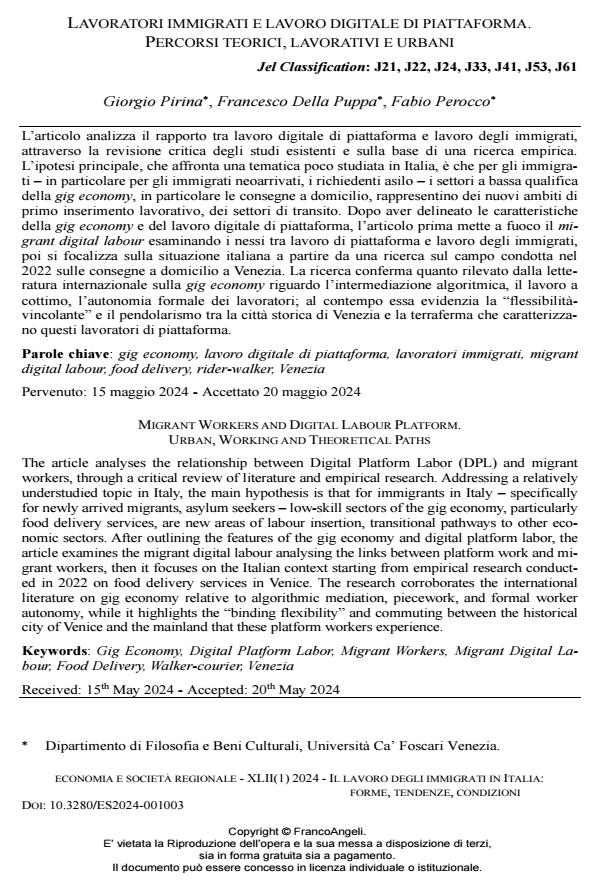Migrant workers and digital labour platform. Urban, working and theoretical paths
Journal title ECONOMIA E SOCIETÀ REGIONALE
Author/s Giorgio Pirina, Francesco Della Puppa, Fabio Perocco
Publishing Year 2024 Issue 2024/1
Language Italian Pages 14 P. 27-40 File size 269 KB
DOI 10.3280/ES2024-001003
DOI is like a bar code for intellectual property: to have more infomation
click here
Below, you can see the article first page
If you want to buy this article in PDF format, you can do it, following the instructions to buy download credits

FrancoAngeli is member of Publishers International Linking Association, Inc (PILA), a not-for-profit association which run the CrossRef service enabling links to and from online scholarly content.
The article analyses the relationship between Digital Platform Labor (DPL) and migrant workers, through a critical review of literature and empirical research. Addressing a relatively understudied topic in Italy, the main hypothesis is that for immigrants in Italy – specifically for newly arrived migrants, asylum seekers – low-skill sectors of the gig economy, particularly food delivery services, are new areas of labour insertion, transitional pathways to other eco- nomic sectors. After outlining the features of the gig economy and digital platform labor, the article examines the migrant digital labour analysing the links between platform work and mi- grant workers, then it focuses on the Italian context starting from empirical research conduct- ed in 2022 on food delivery services in Venice. The research corroborates the international literature on gig economy relative to algorithmic mediation, piecework, and formal worker autonomy, while it highlights the “binding flexibility” and commuting between the historical city of Venice and the mainland that these platform workers experience.
Keywords: Gig Economy, Digital Platform Labor, Migrant Workers, Migrant Digital La- bour, Food Delivery, Walker-courier, Venezia
Jel codes: J21, J22, J24, J33, J41, J53, J61
- Migrant Labour in the Gig Economy Francesco Della Puppa, Dipsita Dhar, Nicola Montagna, pp.1 (ISBN:978-3-031-91261-0)
- Hectic and unpredictable times: the work shifts and everyday Life of Italian-Bangladeshi Uber drivers in London Nicola Montagna, Francesco Della Puppa, Valeria Tonioli, in Globalizations /2025 pp.1
DOI: 10.1080/14747731.2025.2555744 - Life is (Not) a Game: Racial Platform Capitalism, Exploitation Practices and Forms of Rider Mobilization in Milan Luigi Di Cataldo, Federica Cabras, in Cambio. Rivista sulle Trasformazioni Sociali /2025
DOI: 10.36253/cambio-18529
Giorgio Pirina, Francesco Della Puppa, Fabio Perocco, Lavoratori immigrati e lavoro digitale di piattaforma. Percorsi teorici, lavorativi e urbani in "ECONOMIA E SOCIETÀ REGIONALE " 1/2024, pp 27-40, DOI: 10.3280/ES2024-001003